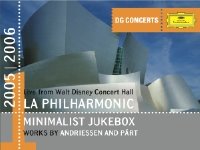Tuesday, April 25, 2006
Tuesday, April 18, 2006
From the Composer's Mouth
"There was a time when gods walked the earth, and everyone had to confront what those gods--Stravinsky, Schoenberg--were doing. There are no gods around now, and I think that's really liberating. Philip Glass has his solutions and Boulez and Ligeti have their solutions, and they're not intended to work for others, which makes it a wonderful time to be a composer. That said, because many of my teachers had the beliefs that came from that time, my music is tremendously structured, controlled, and mathematically generated. No one would ever know that, because I don't want them to know; my structures are hidden, but I am the bastard grandchild of a certain tradition in music."
- David Lang in Theater 30/2 (2000)
Good Times
Apparently, it's a good time to be in non-pop music in general:
With all of the articles we read these days about the declining popularity of classical music, the fact is that we are living at a time when a new generation of great performers, conductors and composers, like John Adams, Thomas Adès, Pierre-Laurent Aimard, Alarm Will Sound, the Arditti Quartet, Bang on a Can, Ian Bostridge, Osvaldo Golijov, Lorraine Hunt Lieberson, Gidon Kremer, the Kronos Quartet, Simon Rattle, David Robertson, Esa-Pekka Salonen, Dawn Upshaw and many others, (disclosure: some of these artists have recorded for my company) are participating in the creation of a new and original classical music landscape, one that belongs to its generation, just as the classical world of Bernstein, Horowitz, Karajan and Rubinstein belonged to its generation. It is a thrilling time to be a part of the classical music audience.
- Richard Hurwitz, president of Nonesuch Records [NYT via Alex Ross & TSR]

The Internet is increasing the demand for lightning in a bottle - this should hardly be news. If I read about a premiere or event at an orchestra, I want to be able to hear what I missed. It's only natural. It seems like opera could stand to do more along these lines, too, especially considering the lag time and geographical distance between productions. Dr. Atomic, Lysistrata, Ainadamar, and Adriana Mater may be distant memories of unheard pieces by the time a production comes near or a recording comes out, but I'd consider buying an EP's worth of material from the first or second runs of these new operas to get a chance to hear what they sound like.
But we're getting there, and the wave of optimism (no matter how tenuous) that's going around is refreshing.


